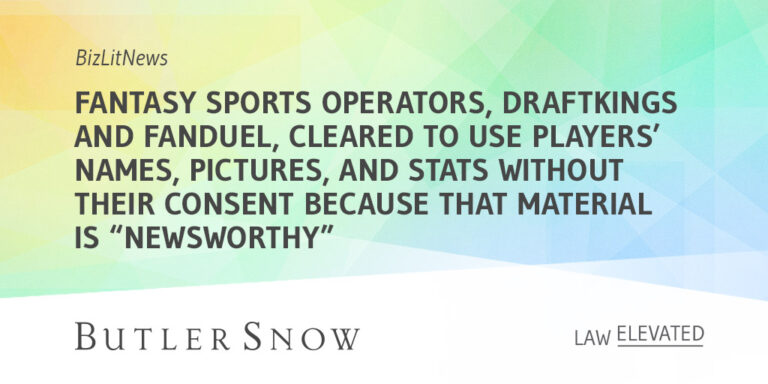On October 24, 2018, the Indiana Supreme Court ruled that online fantasy sports operators, DraftKings, Inc. and FanDuel, Inc., were permitted to use former collegiate athletes’ names, pictures, and statistics without their consent because it determined that material to be newsworthy. On DraftKings’ and FanDuel’s websites, consumers pay a fee to access detailed information about athletes, to assess the athletes’ weekly performances, and to assemble a virtual team of real-life athletes to compete against other users’ teams on the those websites.
The state of Indiana, like many other states, has a right of publicity statute that protects the dissemination of a person’s own information for a commercial purpose. Three collegiate student-athletes brought a putative class action under the Indiana statute against the online fantasy sports operators for using the athletes’ information on their websites without first obtaining the athletes’ consent.
The case began in Indiana state court and was removed to the United States District Court for the Southern District of Indiana, where plaintiffs’ claims were dismissed. The district court judge determined that the conduct of the fantasy sports operators fell under the statutory exception for “material that has political or newsworthy value.” The district court also noted that the fantasy sports site operators’ conduct probably was protected speech under the First Amendment; however, it could not resolve that question at the motion to dismiss stage because there were questions of fact.
The plaintiff athletes appealed to the Seventh Circuit Court of Appeals, which certified the question to the Indiana Supreme Court as a novel issue of state law. The supreme court carefully explained that the holding was narrowly focused on the question before it – whether the “newsworthy value” exception to the right of publicity statute applied to online fantasy sports operators’ use of collegiate athletes’ names, pictures, and statistics for a commercial purpose without their consent. The supreme court determined that it did.
Notably, the court found that the fact that defendants were not media companies or news broadcasters was immaterial to its determination of whether the newsworthiness exception applied. The court determined that the fantasy sports operators’ use of the players’ information bears resemblance to the publication of that same information in newspapers and websites across the nation. The court found that this information “is not stripped of its newsworthy value simply because it is placed behind a paywall or used in the context of a fantasy sports game.”
Authored by Hayley F. Gregory

